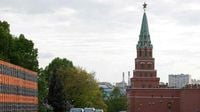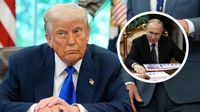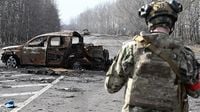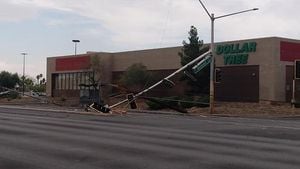In a dramatic escalation of tensions surrounding the ongoing conflict in Ukraine, U.S. President Donald Trump has called for a 30-day unconditional ceasefire between Russia and Ukraine, threatening further sanctions if the proposal is not adhered to. This call came during a phone conversation with Ukrainian President Volodymyr Zelenskyy on May 8, 2025, where both leaders congratulated each other on the occasion of Victory in Europe Day.
Trump's demand for a ceasefire highlights the urgent need for peace talks amid ongoing violence. In his post on Truth Social, Trump emphasized the necessity for both nations to be held accountable for maintaining the integrity of the ceasefire agreement. “It is hoped that an acceptable ceasefire will be upheld,” he stated, adding that if not, “the USA and its partners will impose further sanctions.”
Meanwhile, Zelenskyy expressed Ukraine's readiness for a ceasefire during his conversation with Trump, stating, “We await Russia's support for this proposal.” He reiterated Ukraine's willingness to engage in discussions to end the war, emphasizing that Russia must demonstrate sincerity in its intentions to cease hostilities.
On the same day, newly elected German Chancellor Friedrich Merz reaffirmed Germany's commitment to supporting Ukraine during a phone call with Zelenskyy. Merz assured the Ukrainian leader that Germany would continue to play a key role in aiding Ukraine, both in defending against Russian aggression and in rebuilding after the war. The two leaders agreed that Russia must agree to a ceasefire, as reported by German government spokesperson Stefan Kornelius.
In a related development, the Ukrainian Parliament ratified a raw materials agreement with the United States, which aims to establish a joint investment fund. This agreement is seen as a significant step towards deepening economic ties between Ukraine and the U.S., with Ukrainian Deputy Prime Minister Julia Swyrydenko describing it as a foundation for a new model of cooperation with a vital strategic partner.
Despite the diplomatic efforts, the situation on the ground remains precarious. Ukrainian forces are reportedly attempting to break through the border into the Russian region of Kursk, a move that has drawn sharp condemnation from Moscow. Both sides have accused each other of violating the ceasefire, which was unilaterally declared by Russian President Vladimir Putin to coincide with the 80th anniversary of the end of World War II.
Putin's ceasefire has been met with skepticism from Ukraine, with officials labeling it a “farce.” Ukrainian Foreign Minister Andrij Sybiha stated that Russian forces have violated the ceasefire over 700 times. He noted, “Putin's 'parade ceasefire' is proving to be a farce,” as reports emerged of continued attacks, including guided bombings in the Sumy region.
In a somber reflection during a video address on the anniversary of the war's end, Zelenskyy emphasized the importance of combating “evil” together. He criticized the planned military parade in Moscow as a “parade of cynicism” and called for collective action against aggressors. “Every occupier eventually leaves our land. That is what we are fighting for today,” he asserted.
As tensions rise, the Kremlin is reportedly taking extensive security measures ahead of the Victory Day celebrations in Moscow, fearing potential attacks. Measures include shutting down mobile networks and restricting internet access in the city. This heightened state of alert reflects the ongoing volatility in the region, as both Ukraine and Russia prepare for potential escalations.
Additionally, the European Union has announced plans for a 17th sanctions package against Russia, aimed at targeting entities involved in circumventing existing sanctions and supporting the Russian military. EU officials are actively discussing new measures that could be implemented in the coming weeks.
As the conflict continues, the humanitarian toll remains severe. The UN reported that April 2025 saw the highest number of civilian casualties since September 2024, with at least 209 civilians killed and over 1,146 injured due to ongoing hostilities. The report highlighted the devastating impact of Russian bombardments on urban areas, which have become increasingly frequent.
In light of these developments, Zelenskyy has also indicated a potential shift in Ukraine's economic strategy, considering a gradual move away from reliance on the U.S. dollar towards a stronger alignment with the euro. Central Bank Governor Andriy Pyschnyj noted that this shift could be necessary in light of Ukraine's growing ties with Europe and the fragmentation of global trade.
As the international community watches closely, the situation in Ukraine remains fluid. The calls for ceasefire and peace negotiations are urgent, but the realities on the ground paint a complex picture of ongoing conflict and geopolitical maneuvering. With significant international involvement and local resistance, the path to peace appears fraught with challenges.






